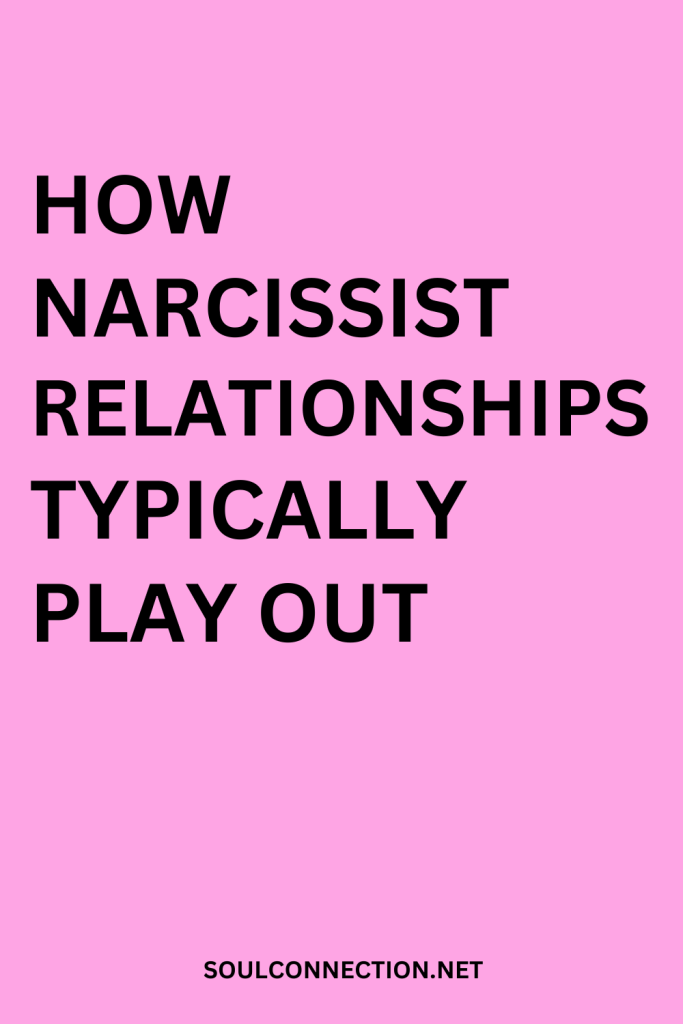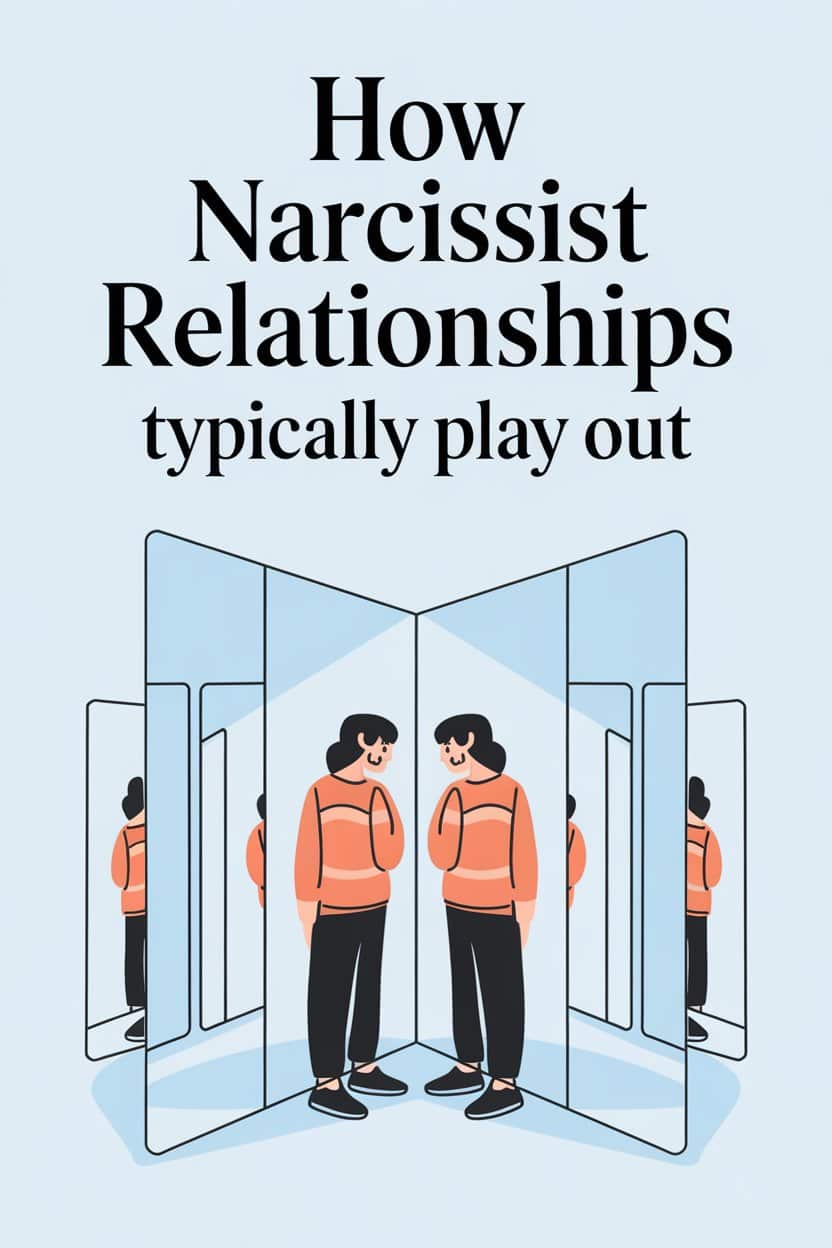Narcissist relationships have a way of feeling like a reality TV show—minus the prize money and catering.
If you’ve ever wondered how these relationships typically unfold, you’re not alone. Many folks find themselves caught in a whirlwind before they realize they’re even holding a broom.
It all starts out so charming. Somehow, it always does.
The Opening Act: Prince (or Princess) Charming Rides In
There’s an undeniable magic in the early days with a narcissist. The attention is laser-focused, the compliments are abundant, and you’re left thinking, “Wow, someone finally gets me!”
Picture someone who not only brings you flowers but probably tells you that you’re the only person alive who truly understands them.
This stage is often called love bombing, but honestly, that phrase barely does justice to the tsunami of affection, gifts, and intense declarations.
Narcissists are masters of making you feel special and chosen. You probably think you’ve hit the romantic jackpot.
Spoiler alert: Those fireworks are just the opening credits.
The Shift: Pedestal Gets Wobbly
After the heady early days, something peculiar happens. That pedestal you were placed on starts to feel a little shaky. The grand gestures slow down, replaced by critiques that land with the subtlety of a sledgehammer.
Suddenly, things you thought were quirky or endearing are now problems.
You might get the sense you can’t do anything right—at least, not as right as you did when the relationship began. You long for the days when you were the center of their universe, but now you’re feeling like an extra in someone else’s movie.
The Gaslight District
Welcome to the part of town where reality gets a little… fuzzy. If you’ve ever found yourself apologizing for something you don’t even think you did, congratulations: you’ve reached the gaslighting phase.
Narcissists have a unique talent for distorting reality until you’re second-guessing your own thoughts, feelings, and even your memory.
What’s that? You remember a conversation differently? Well, apparently, your memory is flawed, you’re “too sensitive,” or you “always overreact.” The more you protest, the more unreasonable you seem. It’s not you—it’s the script.
The Control Olympics: Events May Vary
Control comes in various flavors—some subtle, some less so. Maybe it’s a raised eyebrow when you make plans without them. Maybe it’s a constant barrage of texts asking where you are.
Or perhaps it’s a backhanded compliment designed to keep your confidence just low enough that you rely on their approval to feel good.
The goal is simple: keep you off-balance and easy to manage. Call it psychological gymnastics. Bonus points if you start changing your behavior just to avoid the next conflict.
The Silent Treatments and Sudden Storms
Narcissists don’t do gentle reminders. When things don’t go their way, prepare for the cold shoulder or, on particularly stormy days, a full-blown rage fest.
The silent treatment can last for hours or days, leaving you scrambling to make amends even when you’re not sure what you did.
Other times, they’ll lash out, hurling accusations or dredging up mistakes from years ago. It’s emotional whiplash. One minute you’re fine; the next, you’re thrown into an argument you never saw coming.
The Blame Game—Everyone’s a Contestant
With narcissists, responsibility is like a hot potato—better tossed than held. When something goes wrong, it is almost always your fault. If only you were more supportive, more attentive, more grateful, less… well, you.
Ever found yourself apologizing for things that clearly aren’t your fault? Welcome to the club. The narcissist will always be the victim of your alleged shortcomings.
Flying Monkeys Take Flight
A narcissist rarely fights alone. Enter the flying monkeys—friends, family, or even strangers recruited to reinforce their version of events and keep you in line.
These people might call or message you, urging you to “see things from their side” with the subtlety of a sledgehammer (again).
This isn’t just drama; it’s a whole circus. Suddenly, your social circle feels less like a support system and more like a jury.
Breadcrumbing and Hoovers
Just as you’re contemplating your escape, the narcissist senses your detachment. This is when the text messages get sweeter, the apologies start flowing, and suddenly, there’s a reminder of the person you fell for in the first place.
This is called hoovering—because, like a vacuum, they’re sucking you back in. You get just enough crumbs of affection to doubt your instincts and stick around a little longer, convinced that change is right around the corner.
Your Needs on Permanent Hold
At some point, you may notice your needs have taken a backseat—possibly in another vehicle. Emotional support? Not available. Mutual respect? Missing in action.
Attempts to communicate your feelings are met with blank stares or outright dismissal.
If you push harder, you risk another conflict. So, you start downplaying your needs, convincing yourself you’re being too demanding, or that you can cope on your own.
Self-sacrifice becomes your new hobby.
The Great Escape: Trying to Leave
Leaving a narcissist isn’t just about packing your bags or deleting their number. Emotional entanglement, guilt, and fear all show up to the party.
The narcissist might switch tactics, promising to change or threatening disaster if you walk out the door.
Many people leave and return multiple times before making a clean break. The hope that you’ll get back to those magical early days keeps you hooked.
Narcissists know this—and use it. They might even up the ante with grand gestures or crocodile tears.
And if you do manage to leave? Don’t be surprised if they launch a rumour campaign or attempt to reel you back in, just for old times’ sake.
Healing From Narcissist Relationships
Untangling yourself from a narcissist relationship isn’t as simple as blocking their number and binge-watching your favorite sitcoms (though that helps).
The emotional fallout can be heavy. Your confidence may feel like it’s been through a paper shredder, and the urge to second-guess yourself can linger.
Rebuilding starts with small acts of self-compassion. Talk to people who actually have your back. Write down what you experienced, because clarity tends to fade amid all the manipulation.
Therapy—yes, the real kind—can work wonders.
And don’t be shocked if you have to remind yourself, repeatedly, that you’re not the problem. Unlearning their narrative takes time. Be as gentle with yourself as you were with them (maybe more so).
Red Flags Waving From a Mile Away
Wish you’d seen it coming? Most people do. Hindsight has perfect vision, after all.
Next time, watch for the telltale signs: the too-intense early romance, the subtle put-downs disguised as jokes, the weirdly competitive vibe, and that uncanny sense you’re being watched whenever you try to be your own person.
Trust your gut. If something feels off, it probably is.
Why It Hurts So Much
Narcissist relationships are uniquely painful because they start out feeling like a dream and end up as a nightmare. The contrast alone is enough to make anyone doubt their reality.
The cycle of hope and disappointment, affection and withdrawal, leaves scars.
If you’re nursing wounds right now, know that the pain is real, not “just in your head.” Recovery is possible, and life on the other side really can be peaceful—if less dramatic.
Moving Forward Without the Drama
Life after a narcissist can feel suspiciously quiet. That’s a good thing. Healthy relationships don’t come with a side order of chaos.
Take time to reconnect with yourself. Rediscover the hobbies or friends who took a back seat during the relationship. Set boundaries like your sanity depends on it—because it does.
And when you’re ready for love again? Look for mutual respect, not fireworks. Boring never looked so good.
Because peace is the real prize. And it comes with way less emotional whiplash.


